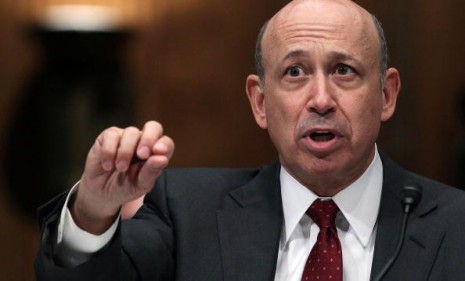Goldman Sachs' SEC settlement: Winners and losers
Goldman Sachs' $550 million fraud settlement is the largest ever paid by a Wall Street firm. But who came out ahead?

A free daily email with the biggest news stories of the day – and the best features from TheWeek.com
You are now subscribed
Your newsletter sign-up was successful
The Securities and Exchange Commission announced a record $550 million settlement with Goldman Sachs, which it sued in April for "making false and misleading statements to investors about a synthetic collateralized debt obligation that was designed to fail." The fine is the largest penalty ever paid by a Wall Street firm, although it's only 4 percent of Goldman's 2009 net profit and half of what the two banks lost (they get $250 million of the settlement cash; the rest goes to the U.S. Treasury). So, who won, and who lost, in this deal? (Watch the announcement of the Goldman settlement)
WINNERS
Lloyd Blankfein:
The Week
Escape your echo chamber. Get the facts behind the news, plus analysis from multiple perspectives.

Sign up for The Week's Free Newsletters
From our morning news briefing to a weekly Good News Newsletter, get the best of The Week delivered directly to your inbox.
From our morning news briefing to a weekly Good News Newsletter, get the best of The Week delivered directly to your inbox.
The Goldman CEO "traded a settlement for his job," says Daniel Gross in Slate. Ending the SEC suit goes a long way toward clearing his name, and the company's — and since the $550 million fine boosted Goldman's stockmarket valuation by about $5 billion, he also just made "Goldman's best trade ever."
The SEC:
The settlement is actually "much tougher than I expected," and the fine is "VERY hefty relative to the size of the deal," says Yves Smith in Naked Capitalism. Plus, the government has forced Blankfein & Co. to admit "bad behavior," a big "climbdown" from blustery denials of any wrongdoing. "All in all, not bad" for the SEC.
Goldman Sachs:
A free daily email with the biggest news stories of the day – and the best features from TheWeek.com
"This is surely a massive win for Goldman," says Felix Salmon in Reuters. Not only is $550 million chump change for the financial giant, but its "entire business was at stake if it was found guilty of serious wrongdoing." Now it can "put the whole sordid tale behind it."
Financial Regulation:
The SEC filed its suit just as the big financial reform bill was gaining steam, and "the case made for the perfect narrative of an evil Wall Street firm that needed to be reined in," says Daniel Indiviglio in The Atlantic. Then the SEC settled just hours after the bill finally passed... "That's not to say there's necessarily a conspiracy at work. It could just be a coincidence, if you believe in that sort of thing."
LOSERS:
Fabrice "Fabulous Fab" Tourre:
The settlement doesn't include "Fabulous Fab," the fallen-star executive who set up the fraudulent Abacus sale for Goldman, says Jim Newell in Gawker. In fact, "it looks like part of the deal was for Goldman to offer the SEC its full support in the continuing investigation of Tourre. Taking one for the team! Ouch."
Goldman Sachs:
"This is a painful loss for Goldman Sachs," says Barry Ritholtz in The Big Picture. For one thing, the bank "paid the highest fine/settlement in the history of the SEC" — "for an ego-driven corporate culture such as Goldie, that is a painful loss" of face. Also, whenever "you admit to misleading investors, you open the firm to future liability" from other clients who lost money on derivatives. That constitutes "a significant litigation risk."
Warren Buffett
The Berkshire Hathaway CEO, a major Goldman investor, is another "loser in the case," says Ritholtz. The billionaire's "claim that GS didn’t commit fraud was wrong. Now Buffett looks like just another shareholder defending an investment, right or wrong. There is mud on his formerly squeaky clean reputation."
John Paulson:
Paulson is the outside investor who "structured the Abacus deal to his liking," says Courtney Comstock in Business Insider. So while it's nice for Goldman that it cleared its name, its admission that Abacus "omitted key information" means that Paulson's "the bad guy" who'll get "slammed in the press."
-
 Political cartoons for February 16
Political cartoons for February 16Cartoons Monday’s political cartoons include President's Day, a valentine from the Epstein files, and more
-
 Regent Hong Kong: a tranquil haven with a prime waterfront spot
Regent Hong Kong: a tranquil haven with a prime waterfront spotThe Week Recommends The trendy hotel recently underwent an extensive two-year revamp
-
 The problem with diagnosing profound autism
The problem with diagnosing profound autismThe Explainer Experts are reconsidering the idea of autism as a spectrum, which could impact diagnoses and policy making for the condition